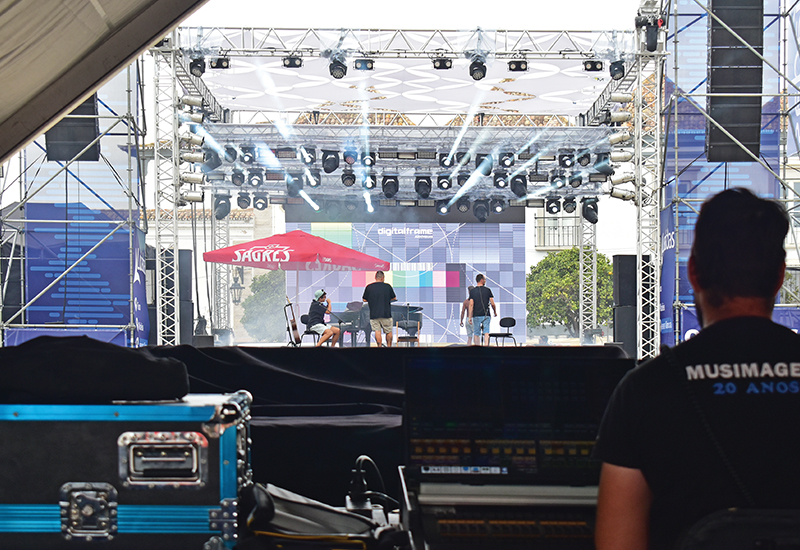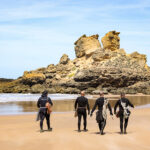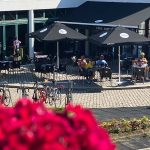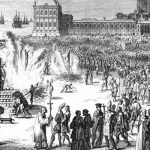I always find it interesting to walk around a venue in advance of an event taking place and watch the preparations, the crews doing the sound and light checks, and the security guys getting anxious every time someone takes a photo. The other day, I was doing just that at the site of the Festival F.
Of all the meaningless words that I really hate reading, “unique” is top of the list, however, when it comes to reporting on an event like this and the music scene in Faro in general, it is hard to find a better one. Add the adjectives diverse, cultural and comprehensive and that pretty much sums up what the Algarve’s administrative capital has to offer. The câmara, Teatro de Faro and various cultural associations organise themed fairs, concerts and festivals throughout the year, and music can easily be found in both the historical old town and (not to be confused with) the nearby downtown areas.
Downtown Faro has a vibrant nightlife, with discotheques and clubs catering for the resident university students and the younger visitors. Rua do Prior, formerly known as “Crime Street” (for reasons best left undefined), is the place to head for if electronic and dance music is your thing. Sorry not for me, let’s move on.
Moving over to the old town and just inside the waterfront entrance of the old walls, we find one of the area’s most iconic buildings that used to be a beer factory and is classified as a property of public interest. I am not sure if that was because of the architecture or the beer. Plans are now underway to transform the former Fábrica da Cerveja de Faro into an artistic and exhibition centre as part of a multi-million euro project that includes the expansion of the town’s municipal museum.
Thankfully, part of this site is already in use with the Associação Recreativa e Cultural de Músicos (ARCM), which was founded in 1990. Over the years, it has been developing and supporting young people in the municipality of Faro and adjacent areas to develop and showcase their artistic and cultural expression. Among the regular events are workshops and debates on musical and other cultural topics. This place has a real down-to-earth, urban vibe that fits well into the faded industrial atmosphere of the wonderful old building. However, it is absolutely the place to hang out and catch up on local and some more established singer-songwriter rock and blues bands. Weekly jam sessions are popular and it’s also large enough to host acts as part of the larger yearly events like the Festival F.
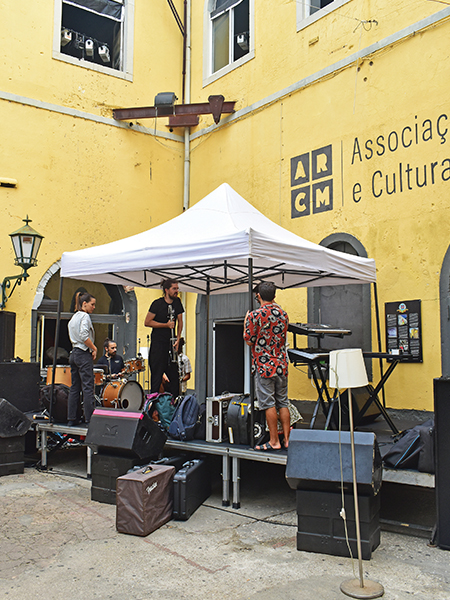
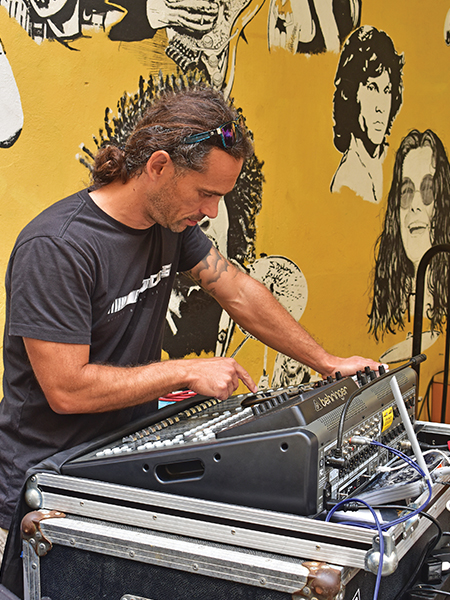
To quote Rogério Bacalhau, Mayor of Faro, “Since its first edition, back in 2014, Festival F has been designed to close summertime. It had to be something that brought visibility to Faro, to be integrated into the old city, where it was developed, and it was thought within these premises, from which the appreciation of what is ours is also highlighted. From our heritage, through the old city, to our culture and people, and to our music. In this sense, Festival F has always been, and still is, a Portuguese music festival.”
Having attended the opening concert later in the day, the sentiments of his words were clearly evident. This was a free concert for the local community to get together and enjoy in the historical heart of their town. The space was packed, the songs performed by a trio of excellent singers were well known and the atmosphere was genuinely heartwarming.
The next evening, the “serious” festival and party began as the major acts hit the stage, complete with fast food and beer stalls, back street artisans’ stalls and film crews. The accommodation in the town is as hard to find as a parking space and yes, Faro will be given some visibility.
Before we leave the old town, the Associação de Fado do Algarve deserves a mention. Depending on the time of year, authentic Fado performances can be seen at either the Faro Municipal Museum or at one of the town’s iconic churches. This is another example of hearing the right kind of music in the right setting, where history, architecture and music come together as a combined experience.
Another venue that is becoming a regular for bands is found In a back street that edges the Ria Formosa wetlands in an older part of town with boat yards and abandoned buildings. In one of the splendid warehouses from yesteryear, Casa das Virtudes has taken residence. This is an independent, family-run contemporary theatre/art space with no municipal council funding or the intrigue of historical interest as marketing leverage. This is a space that anyone can rent and hold an event of their own, where unknown artists get the chance to show their talents. If you like your music events more on the heavy side, the Faro Alternativa in October is the one to look out for.
Before we get the idea that Faro is all about catering for young hipsters and ageing rockers, this is only one aspect of a much larger picture.
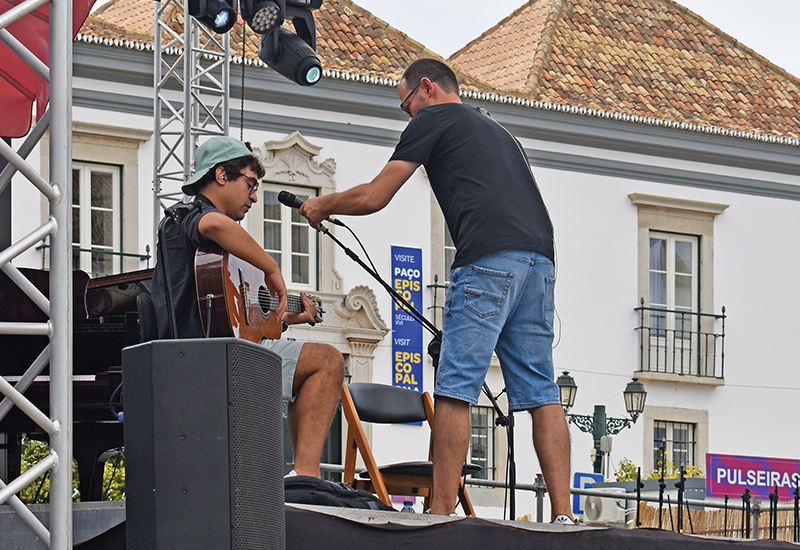
Situated just a few minutes from the harbour is a real gem, the grand old Teatro Lethes. Best described as a classic Italian opera house, she is one of the oldest of its kind in the country. Built as a religious institution back in 1607, later damaged in the Napoleonic war, the Colégio de Santiago was only inaugurated as a theatre in April 1845. The inside is small, giving an immediate feeling of charm and intimacy with four tiers of wooden viewing boxes arranged around the auditorium, filled with rows of red velvet seats. You would be right to expect that the deeply rooted musical traditions of fado and classical Portuguese guitar would be performed here, but the same stage is shared by contemporary bands and classical musicians, including an annual Guitar Fest, which really does fit the must-go to category.
Being small and intimate, though, has its limitations and now we need to move on to the Teatro das Figuras, the municipal theater, which was built to accommodate larger and more complex productions. Again, cultural diversity is one of the main objectives and the venue integrates a concert hall and a grand auditorium with a capacity for 782 spectators. Now opera, full gospel choirs, and international bands and musicians can be added to the picture. During the summer open air, evening concerts are staged here using the large ramp leading up to the entrance doors.
The theatre is also the home of the splendid Orquestra do Algarve ( formerly Orchestra Clâssica do Sul). Renowned for the high quality of its music, the orchestra is supported by a choir and performs in venues across the region and also internationally. Along with traditional concerts for Christmas, New Year, and Easter, classical music lovers can enjoy a series of concerts with national and international conductors and soloists throughout the year in a programme that includes works from baroque to contemporary, as well as music by Portuguese composers.
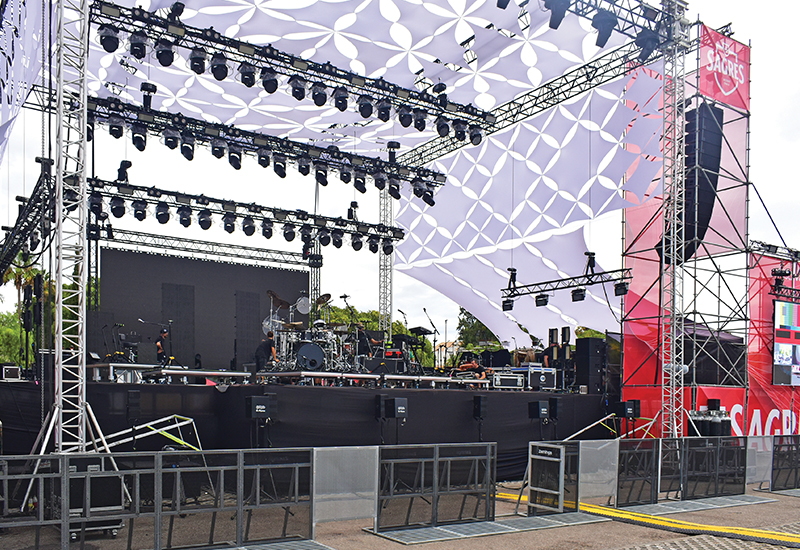
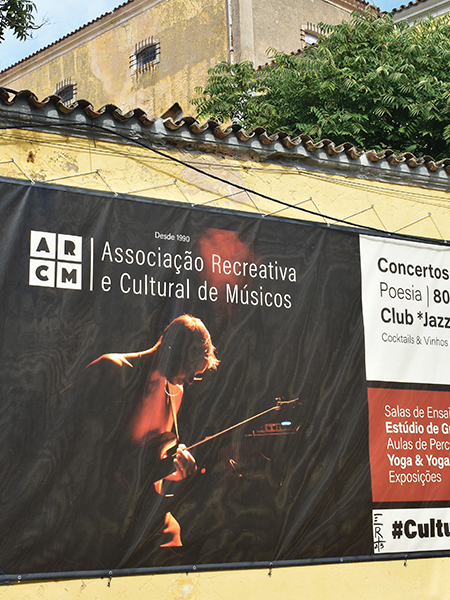
And if all this isn’t enough, I have saved my personal favourite to finish. Struggling to find another replacement for “unique,” this event is something that I have never experienced before and is certainly one of a kind for Faro. Açoteia, the rooftop festival, is formed of nine organisations from different European cities, led by the Municipality of Faro and created by the European Creative Rooftop Network project. Yes, such a thing does exist. Branded as “Another perspective of the city”, over a couple of days, thirty-five rooftops around the town open up to host a selection of short performances. With a daily ticket of only five euros and an event map, visitors are free to move around from one venue to another and make up their own program. I can assure you, that from my experience of this year’s event, another overused adjective, “amazing”, is appropriate. To sit on the open-air rooftop terrace of one of the town’s top hotels on a warm summer’s evening and be entertained for forty-five minutes by one of the country’s famous artists playing a solo acoustic set is about as intimate as it gets. The artists feel a closer contact with their audience and that carries through into the sincerity of the performance. It really felt like they were playing just for us and the small number of people that the space allowed.
Obviously, the council has long-term financial interests and some would argue that organising such an array of events is politically motivated as part of Faro’s bid to be named a European Capital of Culture in 2027. However, there is also no doubt that the desire to keep cultural traditions and musical heritage alive and available for everyone will remain a priority in the future and it is clearly one of the reasons that Faro is becoming a prime destination for travellers and not just the place to fly into.
Photos © Bob Tidy
